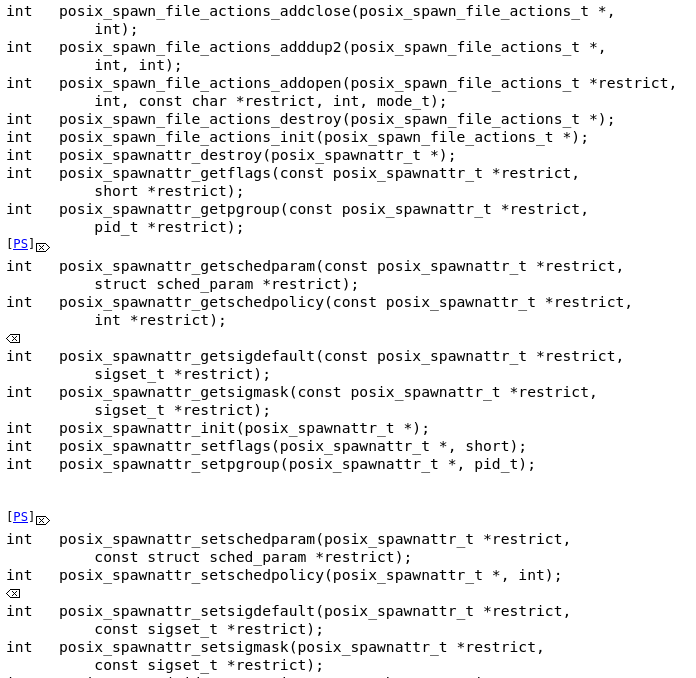Fork versus Elegance
Posted on
The research paper A Fork in The Road contains a good summary of the problems
with the fork call in Unix.
As the paper points out, posix_spawn provides an alternative to fork which
solves some of the performance problems. However, if we set aside the performance
side for the moment, posix_spawn's API kind of gives an impression that, if
that's the alternative, perhaps we should reconsider.
posix_spawn needs a whole flock of posix_spawn_* helper functions, which
provide ways to configure various aspects of the child process:

This is inelegant,
because POSIX already has functions for doing all these things, except that they
only work on the parent process. So posix_spawn has alternate versions of all
these things, that operate on the child instead of the parent. And even with all
the features made available this way, it still doesn't turn out to cover
everything that people want to do.
In all, posix_spawn just doesn't feel "Unixy".
In contrast, fork allows the child to be configured with the same APIs as the
parent. It can do everything, with no API duplication. Does this mean that
maybe fork is an elegant way to design systems after all?
Not necessarily.
A different perspective
One reason why posix_spawn is simultaneously complex and insufficient is
that Unix has a lot of resources implicitly associated with processes, that
then need to be configured.
One such resource is the current directory. It acts a lot like a file descriptor for a directory, except that the OS implicitly holds onto to it on behalf of the process.
There isn't any fundamental reason why userspace couldn't hold onto this file
descriptor itself. If a current directory handle were passed into a process
alongside stdin, stdout, and stderr, userspace could use it and manage it
explicitly, and there'd be no need for a dedicated chdir system call.
And in a posix_spawn situation, the parent could pass any file descriptor to
be the child's current directory, using the same mechanism as passing other
file descriptors.
So, what if we had an OS that took this even further? What if we moved even more state out of the process, and into resources that would be explicitly managed via file descriptors?
That would let parent processes easily configure resources for their children processes without needing special APIs. All they'd have to do is use the regular system calls to set up file descriptors they want their child processes to have.
But wait, there's more
If we managed Linux namespaces with file descriptors, we could avoid having a
bunch of flags on clone to say what parts of the parent get copied to the
child. And we could give userspace more control over how it wants to share
things.
To be sure, at this point we're talking about a fair number of file descriptors.
A design like this would likely also want better ways to manage and pass
around file descriptors. As the paper above points out, the fork+exec way
of having children inherit file descriptors from the parent (with O_CLOEXEC as
an awkward opt-out) already isn't great. Perhaps what we'd want is a way to
pass file descriptors to the child explicitly, rather than relying on children
implicitly inheriting them. At this point though, I'll leave that for future
possible blog posts.
What does it all mean?
fork's apparent simplicity is built on an underlying complex system, which
attaches a lot of implicit resources to processes.
A new OS that doesn't attach as many implicit resources to processes wouldn't
necessarily need either fork or posix_spawn's flock of helpers as
primitives.